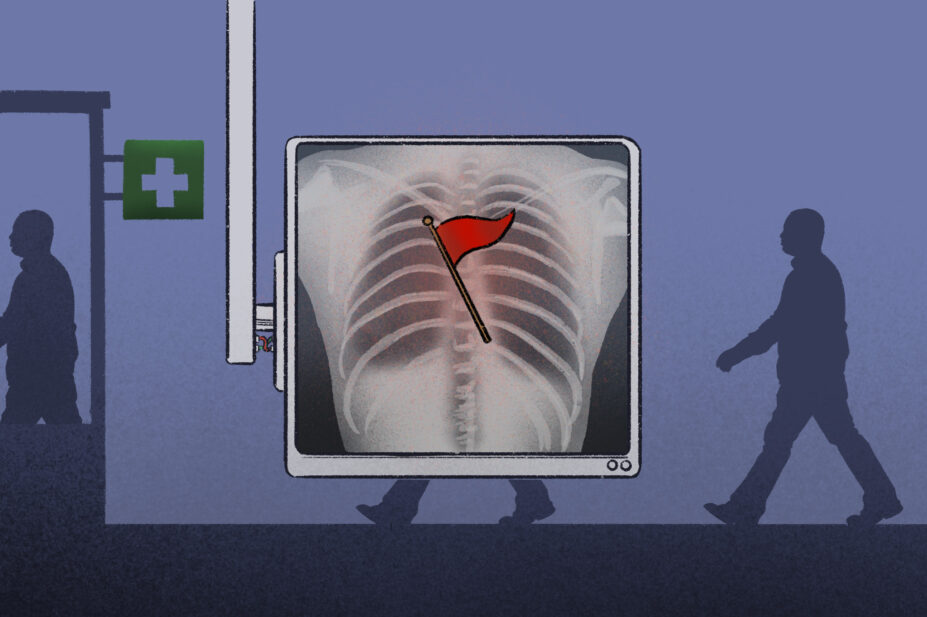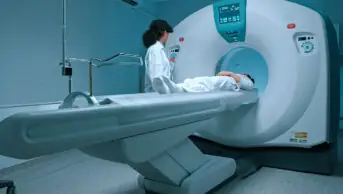
Wes Mountain/The Pharmaceutical Journal
As an oncology pharmacist undertaking a clinical leadership fellowship through the Health Education England Future Leaders Programme, I have been able to work with NHS West Yorkshire Integrated Care Board (ICB) to develop services that support patients with possible cancer symptoms to access appropriate testing.
One such service aims to use the expertise of the community pharmacy workforce to help patients with symptoms of possible lung cancer access diagnostic services in Leeds.
Lung cancer is the third most commonly diagnosed cancer in the UK. The stage at which disease is identified can have a significant impact on prognosis, with patients diagnosed at an earlier stage having better outcomes than those identified with more advanced disease. While GPs play a vital role in identifying and referring patients for investigation, researchers have recognised that there are opportunities to enhance access to diagnostic testing for patients with symptoms that would further improve clinical services.
Community pharmacies are a highly accessible network of healthcare providers, who conduct 1.2 million patient consultations per week in England. As such, community pharmacies are well positioned to help facilitate opportunistic identification of patients with symptoms that would benefit from further investigation. This potential has been recognised by NHS England, which has commissioned an ongoing project to assess the viability of referring patients with red-flag symptoms directly into diagnostic services from community pharmacy. Several small-scale projects across the country have previously provided a proof of concept, but have highlighted the challenges in ensuring that the community pharmacy workforce is suitably trained to enable them to safely make referrals into diagnostic radiology services and comply with current legislation.
NHS West Yorkshire ICB realises the significant potential of the community pharmacy network and has established a pilot project — funded by the West Yorkshire and Harrogate Cancer Alliance — working alongside the Leeds Teaching Hospitals NHS Trust, to explore the impact on patient care. This pilot uses an alternative model to the direct referral of patients, which is being explored within the NHS England project and will instead review the impact of integrating community pharmacies within an existing self-request service to help patients across the city access radiological investigations.
We hope that this pilot will help to improve access to diagnostic testing among patient populations who experience inferior health outcomes across the city
The Leeds Teaching Hospitals NHS Trust has provided a self-request chest X-ray service for the past decade, which aims to improve patient access to diagnostic testing. This walk-in service enables patients with symptoms that would benefit from further investigation to have a chest X-ray without requiring a referral from their GP. This service has proven to be successful in increasing patient access to lung cancer diagnostic testing, with X-ray services available at multiple locations throughout the city. Similar patient-led services are currently limited to a handful of regions across the country but are being considered by many NHS trusts as a possible tool to improve patient access to testing.
The pilot in Leeds, which has been developed with the support and expertise of Community Pharmacy West Yorkshire, aims to capitalise on the huge potential of community pharmacy teams to help identify patients with symptoms of lung cancer that warrant further investigation and signpost them towards the self-request chest X-ray service, following a brief conversation with a pharmacist or pharmacy technician. This pilot provides an opportunity to identify patients when they are seeking advice or looking for over-the-counter treatments to help manage red-flag symptoms, and have ready access to a highly trained healthcare professional who can signpost them appropriately.
We are hoping that signposting patients towards the self-request chest X-ray service will help to provide another opportunity for patients to access radiology services and be diagnosed at an earlier stage of disease, as well as provide further evidence towards the impact of patient-led self-request testing services.
We also hope that this pilot will help to improve access to diagnostic testing among patient populations who experience inferior health outcomes across the city. Addressing such health inequalities is a matter of urgency for the NHS, and community pharmacies are well positioned to take an active role in services that aim to tackle these issues within the communities they serve.
This pilot recognises the changing role of community pharmacy teams and the potential for the network of community pharmacy providers to deliver valuable clinical services which complement those of GPs and NHS trusts. Using the community pharmacy network in this manner has the potential to significantly improve patient care and presents another opportunity to signpost patients with symptoms of possible cancers towards testing services and help them access effective treatments. This pilot has already attracted more than 40 participating pharmacies across the city since it began in February 2024. The service will run until the end of July 2024. Any pharmacies within the Leeds city area who would like to participate should contact the Community Pharmacy West Yorkshire team for further details.


